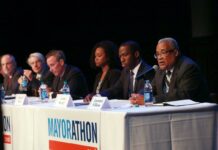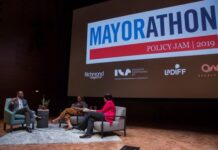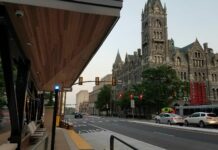Richmond had an eviction crisis before COVID-19 and the pandemic has only exacerbated the problem. To put the looming catastrophe in perspective, consider the following: during July 2020, landlords were awarded an average of $1,787 in each unlawful detainer case. At the time of this writing, there were over 1,200 unlawful detainer cases scheduled to be heard in September. Assuming the average judgment remains roughly the same, this amounts to a total of over $2 million in unpaid rent in September. Not every household facing eviction participates or is eligible for the EDP, nor do they necessarily receive the full 50% of back rent the EDP provides; however, these numbers are illustrative nonetheless. The FY2021 budget allocates $485,000 to the EDP for the entire year. Those funds will be exhausted in roughly two weeks given the current numbers.
Will federal and state programs cover this gap? If not, how will you adequately fund this essential program? What additional solutions do you propose to address the coming wave of evictions?
I was the only member of City Council to propose an amendment to the 2020 budget, which shifted an additional $300,000 into eviction mitigation funds to curb housing instability amid the coronavirus pandemic. I also have co-patroned a resolution with Councilwoman Robertson to dedicate $10 million annually to the Affordable Housing Trust Fund. As a career social worker, housing stability has been something I’ve worked towards long before joining council. We need to review the regulatory standards for landlords and increase the stock of affordable and public housing in the city. In terms of preserving housing affordability, we first need to ensure that existing resources such as the elderly tax relief program are being fully utilized by our elderly friends and neighbors so that they are able to age in place and in their communities. Second, we need to look seriously at instituting a moratorium on rate increases and assessment hikes for residents that have paid off their homes, or have lived in their homes for a certain period of time.
Lack of affordable housing in Richmond is unfortunately not limited to one demographic or neighborhood, it is an epidemic. Not only do we have a shortage of affordable housing stock, but as detailed in a recent New York Times piece focused on Richmond, we have the 2nd highest eviction rate in the country. We have to address this problem comprehensively, and understand that there are systemic factors that make certain people more susceptible to a lack of affordable housing. Historically redlining, disinvestment, and the displacement of communities of color in our city have led to persistent inequities that manifest today in a lack of quality transit access, poor schools, food deserts, and other factors that exacerbate housing instability.
We need to work through RRHA to heavily invest in mixed income, small scale development that is integrated into neighborhoods in a way that is sensitive to transportation needs and area employment opportunities. And, I will advocate along with our Council and Administration at the state level to invest in programs such as the recently adopted Pilot Eviction Diversion Program, and continue to push for increased funding for initiatives such as the Virginia Housing Trust Fund.
One of the most rudimentary functions of local government is to provide residents with adequate public facilities. Yet, despite paying the highest property tax rate in the region, flooding is routine on the Southside, in Brookland Park, and across the city. Backyards are falling into eroded and unmaintained alleys in the West End. Where sidewalks do exist, they are often inaccessible to people with mobility challenges. How will you make sure these basic and essential services are fulfilled by City Hall? What will you do differently?
These issues highlight an incredible opportunity to more fully build trust and relationships with our local neighborhood groups, leaders, and individual community members. I have worked closely with neighborhood civic groups across the 5th District to ensure that their local needs are being met by city departments, and have completed several “neighborhood blitz” style volunteer events where residents are engaged to identify needs on a block by block basis and ensure attention is brought to issue of sidewalks, trash, grass maintenance, potholes, and the like. Structurally, we need to fully fund and invest in DPU and DPW to ensure they have the staff and capacity necessary to respond to the infrastructure needs of residents. I will look to implement a Permitting Strike Force to target the permits that have been outstanding the longest period of time, and work towards fully automating the permit process, as has successfully been done in localities like Alexandria. I would also aim to build on the progress Richmond has made with the 311 app to report problems, and make sure that public-facing city services are accessible and navigable. We have made some progress on the front recently with the newly revamped “rva.gov”. The 2017 Performance Review still has a host of unimplemented recommendations that we can pursue going forward, and I plan to recommit to the participatory budgeting structure championed by Councilman Addison that was cut from this year’s budget to ensure that residents have an integrated opportunity for feedback and input into budgeting decision making.
What kind of policy would you seek to help maintain Richmond’s economic and racial diversity? Are there existing programs that are underutilized, for example the Real Estate Tax Relief Program, that could be leveraged more effectively? Would you support a longtime owner occupant program similar to Philadelphia’s?
There are 3,600 fewer Black homeowners in Richmond today than in 2000. This is a crisis. I hear these exact concerns every day from residents across the District, but particularly from Black and Brown legacy residents on the Southside and in neighborhoods like Maymont and Randolph. Richmond is an absolutely incredible city, and we are attracting thousands of new residents every year, particularly into neighborhoods in the 5th District. This is a good problem to have, but we have to be diligent and holistic in managing the downstream effects of this growth. Fundamentally I think this is an issue that requires a two pronged approach. One, we need to ensure that there is adequate and affordable housing for the residents that are moving in. I’ve already taken action on that front by fighting for additional funding for the Affordable Housing Trust Fund, and by incorporating the recommendations from the “Southside Revitalization Task Force” into the Richmond 300 plan to prioritize building more dense housing south of the river in underdeveloped parcels. Going forward, we need to do away with exclusionary zoning in large swaths of the city to allow for more dense, mixed use, and multi unit developments, require more robust “CBAs” or Community Benefit Agreements from private developers to earmark units for affordable housing, and further leverage the Maggie Walker Land Trust to offer affordable homes to families while also adding generating more tax revenue from city owned properties. Second, we have to mitigate the effects of gentrification on existing residents. Just last month, I patroned a resolution to extend the Elderly and Disabled Tax Exemption deadline to October 30th to allow more of our legacy residents time to apply, and we need to continue to fund and support efforts at disseminating information about that program. I’m also working with our state level delegation to pass legislation to allow for localities to offer tax credits for long term/legacy residents to be able to afford to stay in their homes. Unfortunately, the Virginia constitution limits the basis on which a locality can provide tax relief as of right now, so there’s a lot of work to be done in concert with our state representatives.
Richmond was denser in 1950 than it is today. Increased density cuts housing costs for residents, preserves the City's limited greenspace, and saves the City money on providing essential services. What changes, either administratively or via ordinance, can the City make to help create dense residential development? What steps can Richmond take to entice, encourage, and facilitate additional residential development? How do we ensure a diversity of housing stock that is accessible to Richmonders at all income levels?
I support the recommendations laid out in the city’s new affordable housing plan to ensure that we encourage dense development across Richmond, but particularly along our major transit corridors and along existing/future bus routes. We also need to invest in and pursue the recommendations laid out more generally in the RVA 300 plan. I’ve fought for additional funding for the Affordable Housing Trust Fund, and to incorporate the recommendations from the “Southside Revitalization Task Force” into the Richmond 300 plan to prioritize building more dense housing south of the river in underdeveloped parcels. Going forward, we need to do away with exclusionary zoning in large swaths of the city to allow for more dense, mixed use, and multi unit developments, require more robust “CBAs” or Community Benefit Agreements from private developers to earmark units for affordable housing, and further leverage the Maggie Walker Land Trust to offer affordable homes to families while also adding generating more tax revenue from city owned properties.
While the City of Richmond and the Richmond Redevelopment & Housing Authority (RRHA) are subject to federal regulations and budget allocations, there is nothing preventing the full engagement and partnership between these governing bodies and the residents they serve. Unfortunately, the history of public housing in Richmond is a history of distrust, betrayal, and silencing of public housing residents themselves. Like many cities across the nation, Richmond intentionally built highways to segregate and isolate public housing from the rest of the city, effectively preventing its residents from participation in the city's prosperity. Richmond used Urban Renewal to demolish public housing units without a one-to-one unit replacement which resulted in the physical and emotional destruction of public housing neighborhoods. While this is the history of Richmond's public housing, there is nothing that mandates that it also be the future. If elected, how will you work with public housing residents? How will you ensure that residents get to decide their own collective futures rather than having a government entity decide what is best for them?
Richmond is home to some of the oldest public housing in the nation, and it is in dire need of redevelopment. RRHA is responsible for more than 3,800 public housing units that house our City’s most vulnerable residents, and our approach to redevelopment must fully engage current residents and ensure that they are not displaced during the redevelopment process. I would support a resident input process by which individual residents and families were given the option to accept choice vouchers to relocate themselves and their families with the assistance of step by step counseling and integration of local community supports, or choose to remain in their existing community as the reconstruction of individual units takes place. I would support shifting our current funding source to Section 8, a better funded and supported federal program. I have also called for further funding the Affordable Housing Trust Fund with an additional dedicated $10 million a year, and I would like to additionally further fund initiatives like the Maggie Walker Land Trust and ensure that more homes are set aside for residents in the lower ranges of the AMI.







